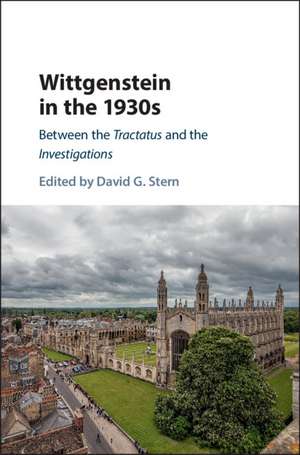Wittgenstein in the 1930s: Between the Tractatus and the Investigations
Editat de David G. Sternen Limba Engleză Hardback – 3 oct 2018
| Toate formatele și edițiile | Preț | Express |
|---|---|---|
| Paperback (1) | 286.51 lei 43-57 zile | |
| Cambridge University Press – 5 aug 2020 | 286.51 lei 43-57 zile | |
| Hardback (1) | 701.06 lei 43-57 zile | |
| Cambridge University Press – 3 oct 2018 | 701.06 lei 43-57 zile |
Preț: 701.06 lei
Preț vechi: 787.71 lei
-11% Nou
Puncte Express: 1052
Preț estimativ în valută:
134.14€ • 140.44$ • 110.100£
134.14€ • 140.44$ • 110.100£
Carte tipărită la comandă
Livrare economică 07-21 aprilie
Preluare comenzi: 021 569.72.76
Specificații
ISBN-13: 9781108425872
ISBN-10: 1108425879
Pagini: 310
Dimensiuni: 156 x 235 x 20 mm
Greutate: 0.7 kg
Editura: Cambridge University Press
Colecția Cambridge University Press
Locul publicării:Cambridge, United Kingdom
ISBN-10: 1108425879
Pagini: 310
Dimensiuni: 156 x 235 x 20 mm
Greutate: 0.7 kg
Editura: Cambridge University Press
Colecția Cambridge University Press
Locul publicării:Cambridge, United Kingdom
Cuprins
Introduction: Wittgenstein between the Tractatus and the investigations David G. Stern; Part I. Changes and Continuities in Wittgenstein's Philosophy: 1. Wittgenstein and Moore on grammar David G. Stern; 2. Wittgenstein on understanding: language, calculus and practice Alois Pichler; 3. Wittgenstein on sentence-hypotheses and certainty Mauro L. Engelmann; 4. Wittgenstein on meaning, use and linguistic commitment Anna Boncompagni; 5. Will there soon be skilful philosophers? Wittgenstein on himself, his work, and the state of civilization in 1930 Wolfgang Kienzler; 6. Wittgenstein and his students: 1929–33 James C. Klagge; Part II. Philosophy of Mind: 7. From Moore's lecture notes to Wittgenstein's Blue Book Hans Sluga; 8. 'Two kinds of use of 'I'': the middle Wittgenstein on 'I' and the self William Child; 9. Wittgenstein on rules and the mental Volker A. Munz; Part III. Religion, Ethics, and Aesthetics: 10. Wittgenstein's discussion of 'use of such a word as 'God'' Anat Biletzki; 11. Wittgenstein on ethics, May 1933 Duncan Richter; 12. Wittgenstein on aesthetic normativity and grammar Hanne Appelqvist; 13. Wittgenstein's remarks on aesthetics and their context Joachim Schulte; Part IV. Philosophy of Mathematics: 14. Moore's notes and Wittgenstein's philosophy of mathematics: the case of mathematical induction Warren Goldfarb; 15. Wittgenstein, Goodstein and the origin of the uniqueness rule for primitive recursive arithmetic Mathieu Marion and Mitsuhiro Okada.
Recenzii
'Overall, the collection is excellent - it includes interesting, well-written essays by notable Wittgenstein scholars … Stern's introduction is especially helpful in situating the book in the existing literature and debates, and may be of broad interest.' M. J. Moore, Choice
'For Wittgenstein, throughout his life, philosophy was seen as 'not a doctrine but an activity' … This philosophical unrest is exposed, analyzed and discussed throughout the book. … The present volume, then, does a great service for Wittgenstein scholars and followers - not only because of the depth and quality of the essays comprising it but also in reminding us what philosophy 'as an activity' may mean.' Notre Dame Philosophical Reviews
'For Wittgenstein, throughout his life, philosophy was seen as 'not a doctrine but an activity' … This philosophical unrest is exposed, analyzed and discussed throughout the book. … The present volume, then, does a great service for Wittgenstein scholars and followers - not only because of the depth and quality of the essays comprising it but also in reminding us what philosophy 'as an activity' may mean.' Notre Dame Philosophical Reviews
Descriere
Shows the importance of Wittgenstein's philosophy in the 1930s, in its own right and for his philosophy as a whole.
